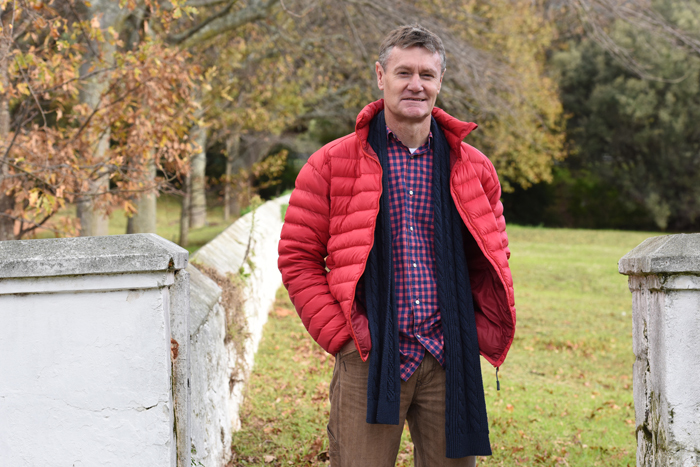PhD on military conscripts builds on poetic expression
13 July 2016 | Story by Newsroom
PhD scholar Stephen Symons describes his research as fairly controversial, focusing as it does on how contemporary South Africa deals with issues of masculinity and whiteness.
“Most of the ex-conscripts are now middle-aged men who are in positions of power and hold economic and social sway over decision-making in our country. So I think it's very important that we acknowledge and explore those domains.”
Symons is working on his doctoral thesis in the Centre for African Studies, under the supervision of Dr Siona O'Connell and Professor Nick Shepherd (“They've both been very engaging and supportive”).
His thesis is rooted in a master's degree in creative writing (with distinction) from UCT, an “illuminating experience”, and a personal wellspring of writing and poetry on his memories as a conscript. It avoids the well-trodden territory of the South African Border War and focuses on the socialisation and militarisation of white males and the initial phases of national service in the SADF.
“It was a largely universal social process for white apartheid-era males so it's interesting to see how they navigate their masculinity and whiteness in contemporary South Africa,” said Symons.
When he gave a lecture to a postgraduate class at the Centre for African Studies, the mostly young students were fascinated to learn that conscription existed during apartheid South Africa.
“My research disrupts notions for the younger generation of what it was like to be a white male during apartheid,” added Symons.
Approximately 660 000 men were conscripted, he says.
“A whole generation went through this process so the aftershocks are still felt today. And they're felt by subsequent generations as well; their children also feel the aftershocks of the event.”
Conscription Symposium
In January Symons was invited to participate in the first Conscription Symposium at the Beyers Naudé Centre at Stellenbosch University. This fairly new academic initiative aimed to draw attention to apartheid-era conscription.
“There's been an obvious need for these men to tell their stories. The next step will be to allow other South Africans of that era to engage and acknowledge these histories,” said Symons. “It's not only white conscripts that experienced the pain of that particular era.”
He believes that active engagement on these taboo issues is crucial.
“Many say 'these are histories that need to be acknowledged'. I believe it's the only way we as South Africans can move forward. It allows for a humanisation of the experiences and also allows these men to accept their roles in that era of history.”
A poet's voice
His own writing and poetry − some of his poems are drawn from his personal experiences as a conscript − have fed his PhD. Here he has been particularly interested by what younger voices and researchers are saying about that “largely silenced” period of history.
“It's fresh, uncharted territory ... I believe there's a real need for younger academics to research the apartheid era,” said Symons.
Symons specialised in poetry during his MA in creative writing, a journey that was encouraged by the late Professor Stephen Watson and his supervisor and mentor Professor Kelwyn Sole. Until then Symons had never considered writing poetry seriously and getting his voice into the public sphere.
As a result, Symons' poetry, essays and short-fiction have been published widely throughout South Africa. His short fiction was published in 2015 in the Short.Sharp.Stories anthology Incredible Journey, and has been 'highly commended' for the 2016 Short.Sharp.Stories awards anthology Die Laughing. His unpublished collection, Spioenkop, was listed as a semi-finalist for the Hudson Prize for Poetry (US) in 2015.
He recently launched his latest collection of poems, Questions for the Sea (uHlanga Press), at the Book Lounge. This debut anthology provides a glimpse of a voyage through the vast and unknowable depths of the ocean and adulthood. It deals with topics such as love, war, nostalgia and fatherhood.
A selection of his poems has been chosen for a special world poetry edition of Re-Markings, a refereed, international bi-annual journal of English that will be published in 2017.
His work also includes a visual aspect that draws from his graphic design experience.
Next year is going to be especially busy. Symons aims to complete his PhD in 2017 but also plans to hold a visual exhibition and installation at The Castle, based on his research.
Story Chido Mbambe. Photo Michael Hammond.
 This work is licensed under a Creative Commons Attribution-NoDerivatives 4.0 International License.
This work is licensed under a Creative Commons Attribution-NoDerivatives 4.0 International License.
Please view the republishing articles page for more information.










